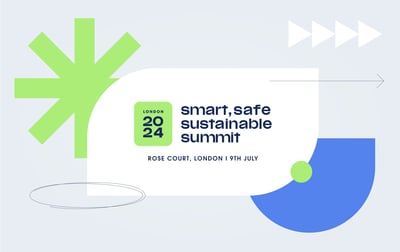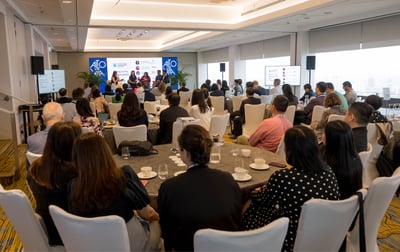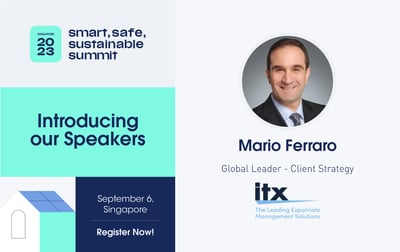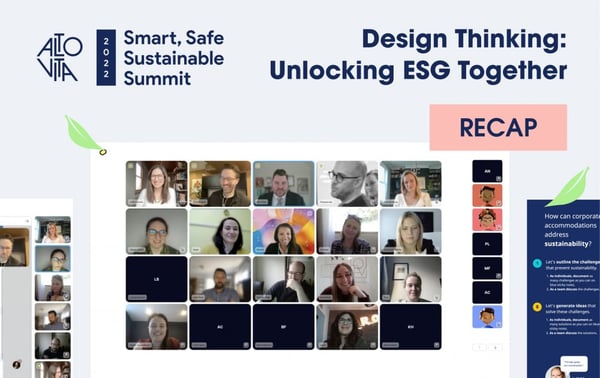
Smart, Safe, Sustainable Summit
Design Thinking: Unlocking ESG Together Recap
The Smart, Safe, Sustainable Summit kicked off on Thursday, March 10th with Design Thinking: Unlocking ESG Together. During this interactive hour, we collaborated with more than 100 talent mobility and business travel professionals coming together from 29 countries to address how to improve smart technology, guest safety and security, and sustainability within the temporary housing space.
Our esteemed moderators Chris Roberts, Chief Operating Officer of Pivt, and Ben Cross, VP of Global Growth at AltoVita, guided the event, with the Summit’s incredible Ambassadors leading focused breakout room discussions. In the end, a whopping 55 challenges were discussed, with 89 solutions proposed.
Read on to hear from our Ambassadors what transpired in each breakout room, and stay tuned to see how AltoVita’s tech team digests the Design Thinking learnings and turns them into actionable, real tools which will be revealed at the Summit’s final event on May 12th in London.
Watch the Recap
Jump to section:
Smart Technology Breakout Room
Led By Caroline Boyle, VP of Global Client Success at AltoVita
 “Our Smart Technology breakout room inspired a lively discussion about wide-ranging problems facing the global mobility and business travel industry. As technology is rapidly improving all areas of corporate accommodation we were not limited in scoping the challenges and ‘time drains’ everyone is experiencing today.
“Our Smart Technology breakout room inspired a lively discussion about wide-ranging problems facing the global mobility and business travel industry. As technology is rapidly improving all areas of corporate accommodation we were not limited in scoping the challenges and ‘time drains’ everyone is experiencing today.
From fragmented technology to the requirement of quality corporate accommodation in remote locations; there are some key issues that seem to be widely felt in the sector. RFP (Request for Pricing), manual use of spreadsheets, and group move requests seemed to be a particular pain point as time-consuming data collation. The issues of RFP submissions are common practice from relocation companies to their corporate clients, from hospitality operators to temporary housing agents, and within business travel; there are a chain of people who need to spend time on negotiating, collating, and presenting this data.
We had plenty of solutions to discuss, such as price databases, access to live inventory, and a single platform to provide autonomy when managing reservations. I suspect the AltoVita product team will be able to digest the problems that we identified and suggest some really innovative, smart tech solutions that we have yet to even imagine. Let’s watch how the next phase in the innovation summit unfolds!”
Sustainability Breakout Room 1
Led by Jo Webb, National Key Account Manager at Lamington Group
 “The main topic of discussion was around ‘where do you start’ in terms of sustainability with it being a very wide subject. Our group had some great discussions around more data and initiative sharing within the travel industry and beyond, more government support across the board including education on the subject, as well as more events like this one to help each other navigate the sustainable world possibilities.
“The main topic of discussion was around ‘where do you start’ in terms of sustainability with it being a very wide subject. Our group had some great discussions around more data and initiative sharing within the travel industry and beyond, more government support across the board including education on the subject, as well as more events like this one to help each other navigate the sustainable world possibilities.
Next up for discussion was choosing the right suppliers and how this can assist with each company’s journey, from reducing single-use plastic and being able to easily source from suppliers that are sustainable. We all agreed that a global online directory of products and services that are sustainable (with a rating) would be a great tool to assist with decision making in this field but most importantly – for companies to build using these sustainable suppliers into KPIs to ensure commitment and tracking YOY.
And the final main point of discussion was around policies in the travel industry and calling on users of the travel industry to start making decisions based on sustainable options rather than budget. This issue is not going to be solved by one or the other but with us all working toward a common goal.
So many great conversations in a short period of time and I am very much looking forward to the next events in the Summit to see these discussions come to life. My general opinion on the subject is – yes, it is a huge subject but a very important one. My main advice is to do what you can. Learn, make changes both personally and professionally, big or small as every little change can help push us toward a better world. Share knowledge and keep supporting each other as alone we cannot make the difference but together – we could solve the whole issue.”
Sustainability Breakout Room 2
Led by Dominic Offer, Director of Sustainability & Business Development at Bristol Global Mobility
 “As one of the lucky ambassadors for sustainability, I got to host a room full of great ideas along with interesting questions and solutions. The group was really inquisitive and from the get-go was informed that at least one member had no intention of sticking to the agenda, which I loved – in sustainability, we must break out of the normal way of thinking, we have to collaborate in new ways and stop allowing traditional business to define how we operate.
“As one of the lucky ambassadors for sustainability, I got to host a room full of great ideas along with interesting questions and solutions. The group was really inquisitive and from the get-go was informed that at least one member had no intention of sticking to the agenda, which I loved – in sustainability, we must break out of the normal way of thinking, we have to collaborate in new ways and stop allowing traditional business to define how we operate.
One of the biggest points of our table was education, not only as an issue, but also as a solution. The issue came from the breadth and depth of sustainability and how it can be quite daunting trying to understand sustainability, along with how to effectively introduce good ideas into your business, and where to start. From a solution perspective it is really about just that topic, education. The only way to build, get people fully engaged with a company’s strategy, delivery, and good practices is by education.
First, how to define and understand sustainability? The UN Sustainability Development goals should always be a first step, as this is the global standard for action in sustainability. This will help understand the agenda of what needs to be done by all companies and governments worldwide. Allocate actions to a goal set out within that framework then means that it can be tracked and reported on to help gauge its effectiveness.
Another comment was that there was so much to do, and it can be quite overwhelming. Most companies should be focusing on 3 to 4 SDGs as core priorities and supporting others in small ways where they can. There will then be great impact in these areas relating to your business and resources will not be spread thin against any unrealistic goals. Checking best practices within your approach will also be important – many companies are getting into the sustainability market, and they don’t all have good intentions or practices. One such action is just ‘planting trees’ when your company is not looking at reduction of carbon emissions, or any other part of becoming a more sustainable company.
Many think sustainability is just about the environment, however that is only one part of it (albeit a very important part). Companies use the term ESG (Environmental Social Governance): These pillars help guide businesses to ensure that areas like D&I, mental health, and community support are covered, and governance is ensuring compliance, pushing legislation in the right direction, and supporting active movements for better sustainable practices.
The infrastructure within many industries to make change is still not where it needs to be, and sometimes finding solutions for environmental issues can be difficult and expensive, however there are lots of free resources available and processes you can put into place. For example, you can take a B-Corp assessment for free and that will not only tell you where you are, but also exactly what you need to be aiming for in terms of actions. Another is working through sites such as SHIFT (one of my favorites); encourage employees to look through as it is truly illuminating, and many people once they know some of the facts around sustainability will do something at some point to be more sustainable, but it can take time, so it is important not to push people to do things they are not ready for – we all learn at different rates and in different ways. No matter the company, journey, bank balance, or intent, every company can be doing something toward sustainability, whether it be paying staff above minimum wage, encouraging positive and open communication on mental health, supporting D&I initiatives within the workplace, reporting on emissions, or putting best practices or eco-friendly purchase policies in place.
Your supply chain is also for many companies your route to success. Most companies’ scope 3 emissions are their largest source of emissions. A point we spoke about within the session was that accreditations are all good, but don’t be prepared to ask your supply chain to do what you are not doing yourself, and question companies who are asking you to do it if they have not. I have witnessed companies move away from their suppliers who are not doing everything they can to be sustainable, for companies who are sustainable. Be loyal, help suppliers get to where they need to be, and you will be rewarded for it 10x over. Your company’s journey is your supply chain’s journey as well – it is a complete system and if we don’t all get there, we all fail.
Finally, transparency and engagement are crucial. Having a sustainability committee with the ability to suggest and make change and attend events or webinars that teach them best practices will have an impact. Then transparency, just be honest. Commit to a few goals – you don’t have to change the world overnight, but tell your teams and the world what they are. If you don’t hit them, explain why and don’t cover them up. The ambition sometimes gets you to a better place than the goal itself. Don’t be afraid to try and fail, be afraid of not committing to something great.
Finally lastly, above everything else… be kind.”
Sustainability Breakout Room 3
Led by Albena Taseva, Nordic Strategic Sourcing Manager – Business Travel & Facility Management at Codan Forsikring
 “Should you have been tempted to think that ‘one size fits all’ and ‘sustainable lodging choices are easy to find and book,’ please reconsider! Addressing sustainability in the lodging and corporate housing industry is a complex and multifaceted topic. Therefore, our sustainability breakout team approached it holistically, bringing travel managers/buyers’, hoteliers’ and travellers’ perspective into the design thinking workshop.
“Should you have been tempted to think that ‘one size fits all’ and ‘sustainable lodging choices are easy to find and book,’ please reconsider! Addressing sustainability in the lodging and corporate housing industry is a complex and multifaceted topic. Therefore, our sustainability breakout team approached it holistically, bringing travel managers/buyers’, hoteliers’ and travellers’ perspective into the design thinking workshop.
A common challenge for travel managers/buyers and accommodation providers alike is the lack of internationally harmonized sustainability criteria for lodging properties. While various institutions and certification bodies have already developed sustainability frameworks for hoteliers, their implementation is still very much dependent on geographical location and owners’ will to adhere to them. The lack of internationally harmonized green certifications for accommodation poses a difficult certification – choice dilemma (often accompanied by additional financial investment and compliance complexity) to lodging providers. It also puts travel managers/buyers in an ‘impossible to assess and compare’ setting and makes travellers doubt the solidity of their green’ decision-making at point of sale.
‘If you can’t measure it, you can’t improve it’ – this quote is particularly valid for the environmental impact of corporate travel programs. Measuring CO2 for transient and/or long-term hotel stays is very difficult at present, given the practically non-existent visibility of CO2 impact per person per night per property at point of sale in the online booking platforms. Together with the functional deficiency in factoring sustainability with other travel policy compliance parameters, such as cost, travel time, etc., it leaves travel managers/buyers with very few levers to nudge travellers to choose sustainable accommodation options at the time of booking.
The team was both practical and creative in brainstorming possible solutions to the above challenges. Establishing APIs with green certification bodies, entering into strategic partnerships with organizations which have developed detailed CO2 calculation methodology for hotel properties, or developing a feature for factoring simultaneously multiple policy parameters for lodging properties in the booking platform – these were just few of the ideas we touched upon. We can’t wait for the next phase of the Innovation Summit and the exciting discussion it will bring.”
Safety & Security Breakout Room
Led by Justin Ford, Director of Safety & Certification Programs at Breezeway
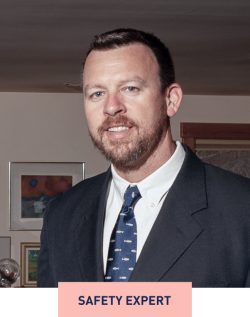 “‘87% of travelers have safety and security on their mind.’ This was a relevant statement as we discussed safety and security around short-term and mid-term rentals at the start of the Summit Focus Groups.
“‘87% of travelers have safety and security on their mind.’ This was a relevant statement as we discussed safety and security around short-term and mid-term rentals at the start of the Summit Focus Groups.
Most people join a discussion on safety or security thinking it’s basic, understood, and addressed by government entities. In fact, most governments don’t come close to addressing all the issues related to the safety and security of rentals. For example, there are very few regulations worldwide that address the most common accident in rentals: slips, trips, and falls.
Our discussion quickly highlighted that participants didn’t know enough about safety and security to have a lot of opinions or suggestions. But, their eagerness to engage around the opportunities that exist showed that they wish they knew more. I think that highlights the situation for the traveler. The traveler shows up to a rental eager to accept the accommodation as a safe and secure place to rest, and assumes that someone has looked out for their well-being. They believe that they can have peace of mind to enjoy their stay, until suddenly, something changes to an uncomfortable feeling after an accident or loss of a sense of security. It’s hard for a professional manager to recover from the lack of trust the traveler has for them after such an event.
Getting out in front of the traveler and reassuring them that the place they have chosen to rent is not only nicely decorated, comfortable, conveniently located, but it is also safe and secure, is a great way to improve the marketability of any rental. Identifying ways to get into the renter’s thoughts and considerations at the time of booking through safety is a win for everyone.
As we move forward, we’ll look at tools that exist that can push AltoVita to the front of the industry when it comes to safety and security.”
Top 5 Reasons to Attend the 2024 Smart, Safe, Sustainable Summit
Let's talk!
Previous Article
'Housing Platform AltoVita Adds Exec to Steer Expansion' x BTN
Next Article

